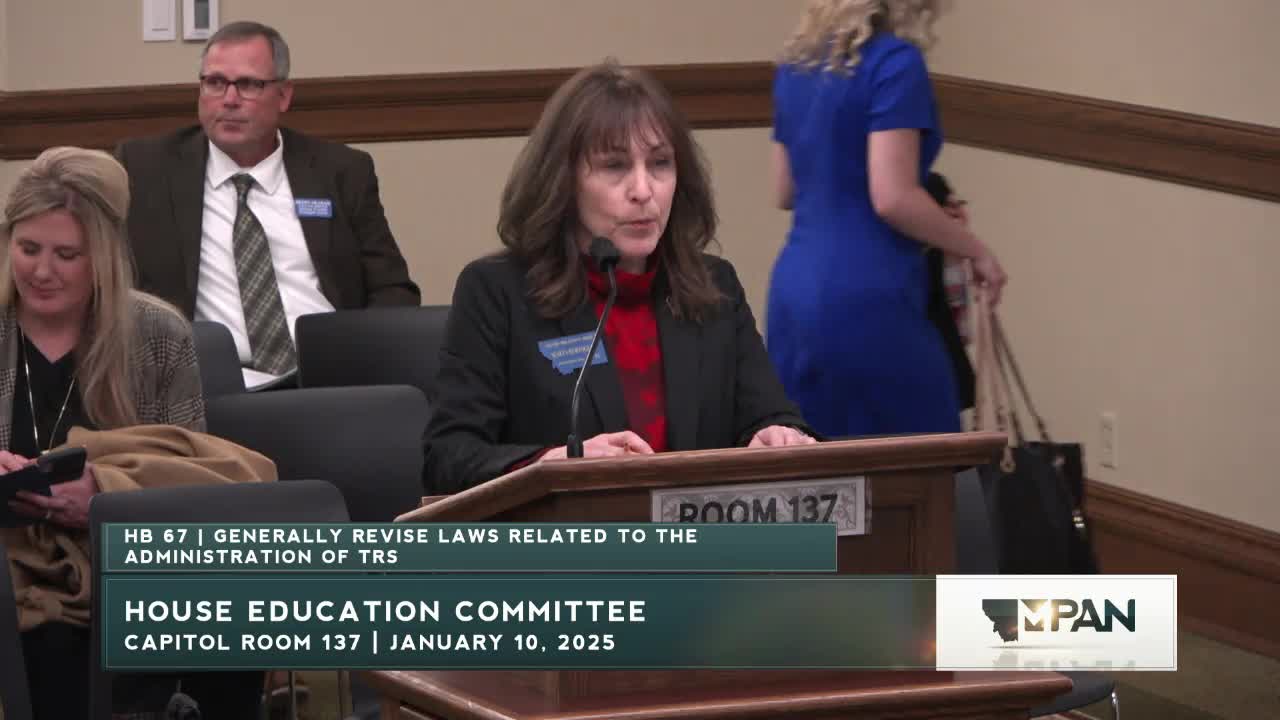Committee reviews technical changes to Teachers Retirement System, board seeks "do pass"
January 10, 2025 | 2025 Legislature MT, Montana
This article was created by AI summarizing key points discussed. AI makes mistakes, so for full details and context, please refer to the video of the full meeting. Please report any errors so we can fix them. Report an error »

Representative Marta Bertoglio opened the hearing on House Bill 67, a technical and compliance bill requested by the Teachers Retirement Board that makes multiple clarifications to TRS statute and incorporates recent federal changes to required minimum distributions.
Sean Graham, executive director of the Montana Teachers Retirement System, described the bill as the biennial "housekeeping" package. Key provisions explained to the committee include: clarifying that extra duty pay (for example, playground or lunch supervision) should be reported to TRS when paid to employees who otherwise qualify as TRS members; defining "educational services capacity" in statute so employers know which positions are reportable to TRS; and requiring employers to report hours and wages for substitute teachers and part‑time paraprofessionals who have elected to defer TRS membership until they work at least 210 hours in a fiscal year. Graham said reporting non‑contributing members from day one will permit TRS to tally hours electronically and flip members to active status automatically once they exceed 210 hours, avoiding costly late corrections.
Graham explained existing purchase provisions: employees who initially opt out but later become active members may elect to purchase prior service for the hours they worked. He said the change clarifies purchase mechanics for cases where individuals cross the 210‑hour threshold between monthly reports.
On federal changes, Graham said Secure 2.0 altered required minimum distribution (RMD) ages. The bill updates TRS statute to mirror the federal schedule: RMDs at age 72 for people born in 1949, age 73 for those born 1951–1959, and age 75 for those born on or after January 1, 1960, consistent with the federal SECURE 2.0 timetable.
Proponents included Rob Watson on behalf of the Coalition of Advocates for Montana’s Public Schools, who supported the extra‑duty reporting and the educational‑services capacity clarification so districts and employers have a clear statutory standard. Committee members asked technical questions about the 210‑hour threshold, what "opt out" means in practice, and placement of the educational services definition in statute; Graham and OPI/TRS staff answered that the 210‑hour threshold exists in current law (described in testimony as seven 30‑hour weeks equivalent) and that the amendment simply improves employer reporting and administrative clarity.
Graham said the bill’s effective date is July 1, 2025, and he asked the committee for a "do pass" recommendation. No committee roll‑call vote was recorded during the hearing; proponents asked for progress to the next step in the process.
Sean Graham, executive director of the Montana Teachers Retirement System, described the bill as the biennial "housekeeping" package. Key provisions explained to the committee include: clarifying that extra duty pay (for example, playground or lunch supervision) should be reported to TRS when paid to employees who otherwise qualify as TRS members; defining "educational services capacity" in statute so employers know which positions are reportable to TRS; and requiring employers to report hours and wages for substitute teachers and part‑time paraprofessionals who have elected to defer TRS membership until they work at least 210 hours in a fiscal year. Graham said reporting non‑contributing members from day one will permit TRS to tally hours electronically and flip members to active status automatically once they exceed 210 hours, avoiding costly late corrections.
Graham explained existing purchase provisions: employees who initially opt out but later become active members may elect to purchase prior service for the hours they worked. He said the change clarifies purchase mechanics for cases where individuals cross the 210‑hour threshold between monthly reports.
On federal changes, Graham said Secure 2.0 altered required minimum distribution (RMD) ages. The bill updates TRS statute to mirror the federal schedule: RMDs at age 72 for people born in 1949, age 73 for those born 1951–1959, and age 75 for those born on or after January 1, 1960, consistent with the federal SECURE 2.0 timetable.
Proponents included Rob Watson on behalf of the Coalition of Advocates for Montana’s Public Schools, who supported the extra‑duty reporting and the educational‑services capacity clarification so districts and employers have a clear statutory standard. Committee members asked technical questions about the 210‑hour threshold, what "opt out" means in practice, and placement of the educational services definition in statute; Graham and OPI/TRS staff answered that the 210‑hour threshold exists in current law (described in testimony as seven 30‑hour weeks equivalent) and that the amendment simply improves employer reporting and administrative clarity.
Graham said the bill’s effective date is July 1, 2025, and he asked the committee for a "do pass" recommendation. No committee roll‑call vote was recorded during the hearing; proponents asked for progress to the next step in the process.
View full meeting
This article is based on a recent meeting—watch the full video and explore the complete transcript for deeper insights into the discussion.
View full meeting
